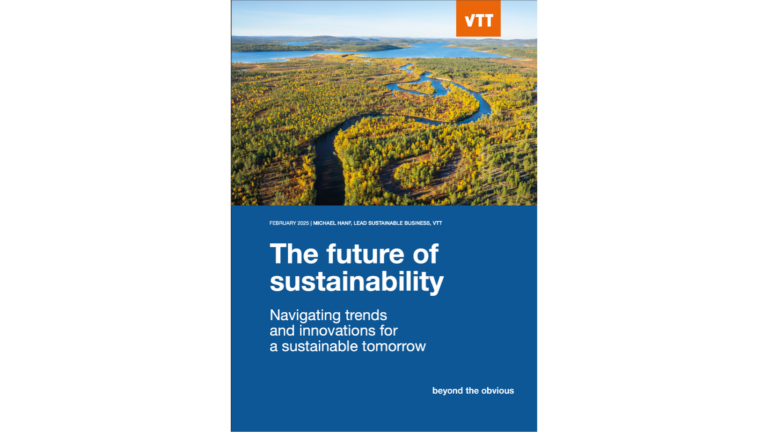The Future of sustainability report provides a comprehensive analysis of the evolving landscape of sustainability. The study aims to forecast key trends and innovations that will shape the future, offering actionable insights and strategic recommendations for businesses, policymakers, and researchers.
Methodology & approach
Trend analysis: The report identifies 87 sustainability trends across four dimensions: societal (16), technological (26), environmental (21), and economic (24). These trends are examined over three timeframes: short- (now–2030), mid- (2030–2040), and long-term (2040 and beyond).
Methodology: A multi-faceted approach was employed, including literature reviews, expert interviews, and the use of advanced Large Language Models (LLMs).
Trend Radar: The development of a trend radar maps out key trends, providing a visual and analytical guide for stakeholders to navigate the future of sustainability.
The perfect storm
Companies are facing a perfect storm of sustainability trends, driven by rapid technological advancements, shifting regulatory landscapes, evolving consumer expectations, and intensifying environmental challenges. From the rise of circular economy models and the integration of renewable energy to the transformative impacts of AI governance, quantum computing, and advanced recycling technologies, the sheer breadth and pace of change are unprecedented.
Navigating this storm requires businesses to not only understand the evolving sustainability landscape but also to critically assess which trends are most relevant and existential to their operations, stakeholders, and long-term goals. Given the reality of limited resources, companies must prioritise efforts that align with their core values and offer the greatest strategic impact. By proactively identifying and addressing these critical trends, businesses can turn challenges into opportunities, securing resilience and competitive advantage in an increasingly sustainability-driven market.
Key findings & strategic recommendations
|
Key findings |
Strategic recommendations |
|
Climate change adaptation and resilience Organisations must prioritise adaptation and resilience strategies to mitigate risks associated with climate-related events. |
Enhance climate resilience Invest in resilient infrastructure and develop comprehensive risk management plans to protect operations and ensure continuity in the face |
|
Decarbonisation and green finance The transition to a low-carbon economy is accelerating, driven by regulatory pressures, technological advancements, and investor demand for sustainable finance. |
Accelerate decarbonisation efforts Prioritise investments in renewable energy, energy efficiency, and carbon capture technologies. Leverage green finance opportunities to fund these initiatives and make sustainability a key factor in attracting investment. |
|
Biodiversity and ecosystem preservation Biodiversity loss continues at an alarming rate, highlighting the need for urgent conservationefforts. |
Integrate biodiversity preservation Incorporate biodiversity preservation into sustainability strategies by focusing on sustainable land use, reducing habitat destruction, and supporting conservation projects. This will help maintain ecosystem services and ensure the sustainability of natural resources. |
|
Technological integration Technological advancements, particularly in artificial intelligence and data analytics, |
Leverage technological advancements Invest in AI and data analytics to enhance sustainability efforts and improve operational efficiency. Implement new technologies to reduce environmental impacts and enhance transparency. |
|
Regulatory and policy influence Geopolitical events and regulatory changes significantly influence sustainability practices. |
Proactively engage with policymakers Stay ahead of regulatory changes and engage with policymakers to drive innovation and maintain a competitive advantage. Proactive engagement will be crucial for influencing and adapting to regulatory developments. |
The future of sustainability report offers a detailed, forward-looking analysis that equips stakeholders with the knowledge and tools needed to navigate the complexities of the modern world. By proactively embracing these trends and recommendations, organisations can drive positive change and ensure long- term success in a rapidly evolving sustainability landscape.
Note of caution: It is important to recognise that forward-looking predictions can be uncertain and are based on our current best understanding. As such, these predictions should be interpreted with caution and flexibility to adapt to new information and changing circumstances.

